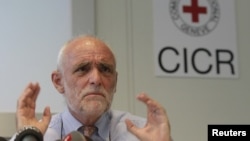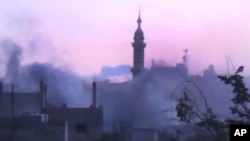GENEVA -- The president of the International Committee of the Red Cross, Jakob Kellenberger, says the ICRC renewed its appeal to the Syrian government Monday for access to the besieged city of Homs to evacuate the wounded and sick. He says the ICRC also needs agreement from opposition groups for the life-saving mission to go forward. The humanitarian group released a new report on its global work.
Last week, the Red Cross asked permission to enter Homs to evacuate those in need of medical care and to assist people stranded in the city. ICRC President Jakob Kellenberger, says he believed Red Cross and Syrian Red Crescent aid workers would be granted access. But, for a variety of reasons, he says this did not happen.
He says the humanitarian needs in Homs require immediate attention, but the ICRC needs agreement from all parties to carry out its mission.
“In order to go to a place in a situation like it is now, it is important to have an unambiguous agreement of those concerned in the violence-of all, I underline of all that you can enter and you can do your job. And, the second point is…we have a responsibility for our staff in security terms,” said the ICRC president.
Kellenberger says the ICRC has to evaluate the security risks to its staff to determine if it is safe enough for them to enter an area. He says Homs and other areas of conflict in Syria are littered with mines and other dangers. He notes a Red Crescent volunteer was shot dead on Friday while on a relief mission.
Moving away from Syria, the ICRC chief presented his agency’s annual report for last year. The report calls 2011 a year of complex and unforeseen crises. It notes major crises erupted in the Middle East and Africa, alongside existing armed conflicts and other violent situations all over the world.
The report notes the ICRC spent about $1.2 billion on humanitarian operations in 80 countries last year. It says Somalia was its largest operation because of great food insecurity in conflict-affected areas. Other large operations include Afghanistan, Iraq, Sudan, Yemen and Libya.
ICRC President Kellenberger says the food and nutrition situation in Somalia is better now than it was one year ago. But, 30 percent of the population still suffers from severe food shortages. He says southern Somalia, which is controlled by the Islamist militant al-Shabab group, remains a big concern because very few organizations are able to work there.
“You do remember that last year, we were the largest actor and were able to build up a food pipeline, distributing food to more than one million persons," said Kellenberger. "But we have for the time being, we have lost access to the Shabab area because we - well we were not ready to pay taxes, alright - as we never do.”
As a consequence, Kellenberger says the Red Cross has redirected part of its food stocks to other parts of Somalia that are not under the control of al-Shabab. He adds the ICRC is not giving up hope about returning to southern Somalia to assist the hundreds of thousands of people who are cut off from aid.
Last week, the Red Cross asked permission to enter Homs to evacuate those in need of medical care and to assist people stranded in the city. ICRC President Jakob Kellenberger, says he believed Red Cross and Syrian Red Crescent aid workers would be granted access. But, for a variety of reasons, he says this did not happen.
He says the humanitarian needs in Homs require immediate attention, but the ICRC needs agreement from all parties to carry out its mission.
“In order to go to a place in a situation like it is now, it is important to have an unambiguous agreement of those concerned in the violence-of all, I underline of all that you can enter and you can do your job. And, the second point is…we have a responsibility for our staff in security terms,” said the ICRC president.
Kellenberger says the ICRC has to evaluate the security risks to its staff to determine if it is safe enough for them to enter an area. He says Homs and other areas of conflict in Syria are littered with mines and other dangers. He notes a Red Crescent volunteer was shot dead on Friday while on a relief mission.
Moving away from Syria, the ICRC chief presented his agency’s annual report for last year. The report calls 2011 a year of complex and unforeseen crises. It notes major crises erupted in the Middle East and Africa, alongside existing armed conflicts and other violent situations all over the world.
The report notes the ICRC spent about $1.2 billion on humanitarian operations in 80 countries last year. It says Somalia was its largest operation because of great food insecurity in conflict-affected areas. Other large operations include Afghanistan, Iraq, Sudan, Yemen and Libya.
ICRC President Kellenberger says the food and nutrition situation in Somalia is better now than it was one year ago. But, 30 percent of the population still suffers from severe food shortages. He says southern Somalia, which is controlled by the Islamist militant al-Shabab group, remains a big concern because very few organizations are able to work there.
“You do remember that last year, we were the largest actor and were able to build up a food pipeline, distributing food to more than one million persons," said Kellenberger. "But we have for the time being, we have lost access to the Shabab area because we - well we were not ready to pay taxes, alright - as we never do.”
As a consequence, Kellenberger says the Red Cross has redirected part of its food stocks to other parts of Somalia that are not under the control of al-Shabab. He adds the ICRC is not giving up hope about returning to southern Somalia to assist the hundreds of thousands of people who are cut off from aid.





